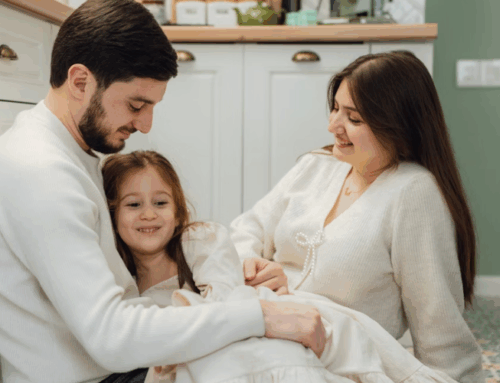We live in a broken world. As a result, we all deal with sin struggles. Like the apostle Paul, even the best of us wrestle with doing the things we hate and failing to do the things we love (Romans 7:18-19). And like Jesus’s disciples, we find that our spirits are willing, but our flesh is weak (Matthew 26:40-41). It’s tough being a godly dad and husband in our culture today.
To make matters worse, many of us carry baggage from the past that weighs us down. The fight against generational sin struggles leave us feeling like we’re trying to break family curses. We wonder if there is any way out.
Thankfully, the answer is “yes.” But, before we can begin tackling these generational stumbling blocks, we need to understand what the Bible says about them.
A biblical view of curses
The terms “curse” and “generational curse” get thrown around a lot in some corners of the Christian world. Passages like Exodus 34:7, where God promised to bring “the consequences of the fathers’ iniquity on the children and grandchildren to the third and fourth generation,” give rise to the belief that curses can be transmitted from parents to their descendants. In context, though, this passage communicates something quite different about how our walk with God should play out.
For starters, we can’t ignore the first part of the verse, in which God describes Himself as faithful to bless and to forgive those who come to Him. From God’s perspective, sin is the ultimate curse on the human race, and He is willing and able to break that curse for those who will put their trust in Him.
Second, the Hebrew wording does not suggest God punishes children and grandchildren for the evil of their parents and grandparents. Instead, God emphasized that just as He is faithful to bless obedience, He is faithful to punish sin. In other words, every individual in every generation is held responsible for his or her own sin.
This aligns with the larger counsel of Scripture. In the law of Moses, God stated that “fathers are not to be put to death for their children, and children are not to be put to death for their fathers; each person will be put to death for his own sin” (Deuteronomy 24:16). The prophet Jeremiah said the same thing centuries later (Jeremiah 31:27-30).
Ezekiel, a contemporary of Jeremiah who prophesied during the Babylonian captivity, made it clear that each person is held accountable for their own actions (Ezekiel 18:1-32). Even if a man’s father commits terrible sins, the father will pay the price for those sins—not the son. Likewise, if a father is righteous, he will not suffer for the sins of his children. Each person will answer for how they responded to God and His commands individually.
Choices and Consequences
So, how can we best understand these generational struggles against sin? How can we overcome the failures we feel as husbands and fathers? From a biblical perspective, we need to focus on choices and consequences, rather than curses.
In one of his final sermons to the Israelites, Moses presented two options for how things could go once they entered the promised land. On one hand, they could rebel against God, which would lead to death. On the other hand, they could embrace His commands and follow His plans, which would lead to life. Moses urged them to “choose life” (Deuteronomy 30:19), but he also acknowledged that each of them would choose for themselves.
Our choices matter because our choices lead to consequences. As noted, God is faithful to His words, whether it means blessing obedience or punishing sin. So, as we determine our path, we also determine the consequences.
And it is these consequences that can wreak havoc on our families. While it might be tempting to think our sinful choices hurt no one but ourselves, the truth is our sin struggles can set the tone for future generations. As men, we are always building a legacy that will resonate long after we’re gone. That’s not a generational curse. It’s a generational consequence of our choices. And we can choose to live as God intended.
This does not happen by accident or through passivity. It takes action and commitment. It also requires a complete commitment to the only One who can set us free from our past.
He became the curse for us
Behavioral researchers talk about “nature versus nurture.” In other words, what are the genetic predispositions in our lives (nature) and what are the result of things we experienced through exposure (nurture). In one sense, dealing with generational sin would fall into the nurture category. Even as Christian men, the evil we experienced in the past and how we experienced it have a tremendous impact on shaping our lives.
But we also can’t ignore our sin nature. The truth is, sin has plagued every human since the garden of Eden. The natural inclination to rebel against God and go our own way is the one guaranteed inheritance each of us has received from our ancestors. As mentioned, it is the only real “curse” hanging over our lives.
But even that curse has been broken, thanks to the work of Jesus Christ. In ancient Israel, being hung on a tree was considered a curse (Deuteronomy 21:22-23). Centuries later, Paul used this passage from the law to show that by dying on the cross (a tree), Jesus “redeemed us from the curse of the law by becoming a curse for us” (Galatians 3:13).
That “curse of the law” is sin. Jesus became sin for us (2 Corinthians 5:21) so that He could free us from sin. That means anyone who has placed their faith in Him for salvation can never live under a curse. He broke any curse sin might have over us.
The Way Forward
Every man inherits a legacy. For some, it’s rooted in faith and wisdom. For others, it’s marred by addiction, anger, or patterns of failure. But in Christ, no legacy is beyond redemption. Jesus didn’t just free us from the curse of sin—He invites us to build something better in its place.
That begins with new habits, honest accountability, and trusted voices around you. You can’t do this alone. If you want to change what your children inherit, you need godly men who will challenge your excuses, pray for your progress, and speak truth when it matters most.
That’s what the Iron Circle Worksheet is for. It helps you build a circle of strong, wise men who walk with you and help you lead with clarity, strength, and purpose. Most men don’t have this kind of support. This is how you start.
Your past may explain your struggle, but it doesn’t define your future. Through Christ, you’re not just free—you’re called. So step into your role as a cycle-breaker, legacy-builder, and faithful man of God.













